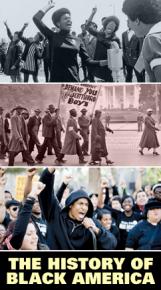The Scottsboro Boys case
The struggle to save the Scottsboro Boys showed that it was possible to defend African Americans from Southern racism and repression--but only through struggle.
THE FIGHT to free the Scottsboro Boys was one of the most important anti-racist battles of the 1930s and 1940s. It exposed the extreme racism of American "justice," southern-style‚ and was the center of a massive solidarity movement initiated and led by the Communist Party.
The facts in the case were straightforward. On March 25, 1931, nine Black youths aged 13 to 21, hopped on a freight train in Alabama in a quest for work. A fight ensued with several white youths who were already on the train. When the whites lost, they complained to the stationmaster, and the nine Blacks were arrested.
Initially, the charges against the nine only related to the fight. But when local authorities discovered that two young white women had also been on the train, they tacked on a rape charge. While there was no real evidence to support a charge of gang rape, the hysterical atmosphere surrounding the trial insured their conviction. Crowds had surrounded the jail from early on, and the National Guard had to be called in to prevent a lynching.
In two short weeks after the incident, the Scottsboro Boys had been indicted, tried, convicted and sentenced to death.
IMMEDIATELY UPON news of the indictments, the CP sent lawyers from the International Labor Defense (ILD), its legal defense wing, to contact the defendants and their families and to organize protest actions.
When the death sentences against eight of the young men were handed down, the party's Central Committee called for a nationwide protest campaign, and ILD lawyers moved to gain sole responsibility for the appeals case. On April 20, just slightly less than a month after the incident had occurred, the defendants signed an agreement giving the ILD full control over the case.
This placed the party in direct conflict with the liberal NAACP, which at first had steered clear of the whole matter. As one of its executives put it, the last thing the group wanted "was to identify the Association with gang of mass rapists unless they were reasonably certain the boys were innocent or their constitutional rights were abridged." But once the convictions were handed down, the NAACP could not stand the thought of Communists handling the appeal.
One of Socialist Worker's earliest features was a monthly series on the history of the African American struggle in the U.S., from slavery to the present day.The History of Black America
A battle for the defendants ensued. At one point, NAACP lawyers convinced the defendants to break their agreement the Communists. But the next day, their parents, with whom the CP lawyers had spent considerable time, convinced their sons to reinstate the agreement.
The debate was over the appropriate strategy to be taken in a civil rights cases in the South. NAACP leaders argued that the goal of the campaign was to guarantee the youths a "fair trial," which would require hiring local attorneys and avoiding any public protest.
The CP rightly argued that "there can be no such thing as a 'fair trial' of a Negro boy accused of rape in an Alabama court." It argued that the strategy should be "to give the boys the best available legal defense" in the capitalist courts, but at the same time, to emphasize "that the boys can be saved only by the pressure of millions of workers, colored and white, behind the defense in the courts."
After the Alabama State Supreme Court upheld the conviction of seven of the defendants and set their date of execution, the U.S. Supreme Court, in the face of mass protests, ordered the death sentences indefinitely suspended and announced it would hear the case in October.
In November, the Supreme Court overturned the convictions, only to order new trials in the Alabama courts. As the new set of trials approached in late March 1933, a new rash of protests erupted, and important new evidence was uncovered. Ruby Bates, one of the two alleged victims in the Scottsboro case, wrote a letter to the Daily Worker declaring that the defendants had never touched her, and that the police had forced her to lie.
Still, Alabama "justice" won out in the end. In the fourth trial, the sentences were reduced to life imprisonment. In the fifth trial, four of the defendants were found innocent. Finally, in 1950, the charges against all the Scottsboro boys were dropped.
The campaign around the Scottsboro boys kept the young men alive, even if it did not win them their freedom immediately.
The lessons of the Scottsboro case also highlight that it was possible to defend Blacks from racism and repression, but that a fight was needed to do so. And further, without the efforts of the left, the Scottsboro Boys would have been legally lynched, like hundreds of others.
The Scottsboro Boys case also showed the necessity to mobilize Black and white workers in the struggle against racism. While the Communist Party of the 1930s had already degenerated from a revolutionary organization to a reformist one, its efforts underline the need to fight racism and build unity in action.
First published in the December 1985 issue of Socialist Worker.



